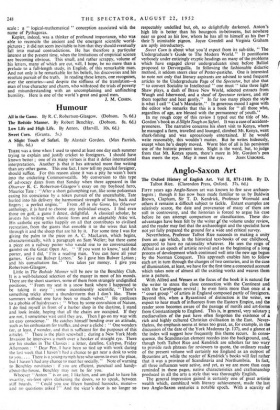Kepler and Astrology •
KEPLER'S three laws of planetary motion are fundamental to modern astro-physics ; it wet- he who first stated that the motion of the planets around the sun is elliptical and not, as Copernicus had believed, circular. For his mathematical work he received little reward in his lifetime except an Imperial pension which, despite every effort, he could seldom collect. Living in the opening stages of the Thirty Years' War, he was welcome nowhere. The honesty of his liberal Protestantism made him suspect on all sides. His life was one of poverty, relieved towards.the end by the uncomprehend- ing patronage of the Imperial General Wallenstein, who was addicted to astrology. Fortunately for himself at that moment, Kepler himself had not abandoned the old belief in planetary influences. In his attitude to astrology, however, he was as independent and as clear-sighted as in his Protestantism. " How does the face of the sky affect the character of -man at the moment of his birth ? " he asks in a letter quoted by Mrs. Baumgardt. " It affects the human being," he answers, " as long as he lives in no other way than the knots which the peasant haphazardly puts round the pumpkin. They do not make the pumpkin grow but decide its shape." The old science, as he saw it, was capable of reading character but not of foretelling events, a conclusion that Can have given his superstitious patron very little satisfaction.
Einstein, in the last paragraph orhis otherwise illuminating intro- duction, slides awkwardly past this point. According to him, Kepler " had to realise that logical-mathematical theorising, no matter how lucid, could not guarantee truth by itself ; that the most beautiful logical theory means nothing in natural science without comparison with the exactest experience." Here he is merely repeating a statement by Kepler himself, that in the philosophy of nature do hidden things can be revealed by geometrical symbols, but only things already known can be put together. He fails to see that Kepler accepted the science of astrology precisely because for him it was no mere logical theory or symbolism. Indeed, he quoted the horoscopes of himself and his unfortunate first wife as proof of its validity.
Kepler, in fact, was far from committed to the empirical standpoint that was eventually to lead to scientific materialism. In his De Har- monice Mundi, the bbok in which he enunciated the third of his famous laws, he boldly assumed that not only men but also the celestial bodies have some soul or awareness of the harmonies of the universe. He sees the planets, indeed, as lying in the same relation to one another, and at the same intervals, as the notes of the musical
scale : a " logical-mathematical " conception associated with the name of Pythagoras.
Kepler, indeed, was a thinker of profound importance, who was able to reconcile the ancient and the emergent scientific world- pictures ; it did not seem inevitable to him that they should eventually fall into mutual contradictions. He has therefore a particular interest at the present time, when the limitations of empirical science are becoming obvious. This small, and rather scrappy, volume of his letters, many of which are cut, will, 1 hope, be no more than a prelude to a full-length study, in English, of this remarkable man. And not only is he remarkable for his beliefs, his discoveries and his resolute pursuit of the truth. In reading these letters, one recognises, over the centuries—and despite the stiffness of the translation—a man of true character and charm, who withstood the trials of poverty and misunderstanding with an uncomplaining and unflinching humility. Here is one of the world's great and good men.
J. M. CORM



























 Previous page
Previous page